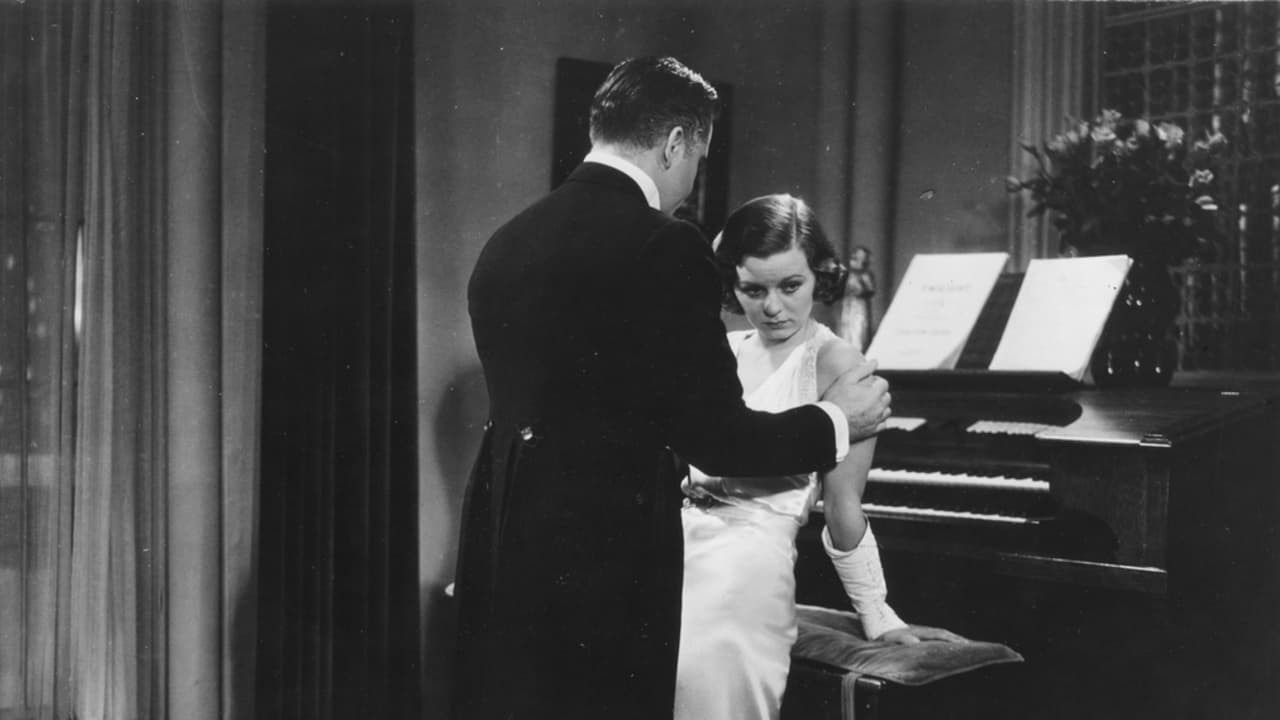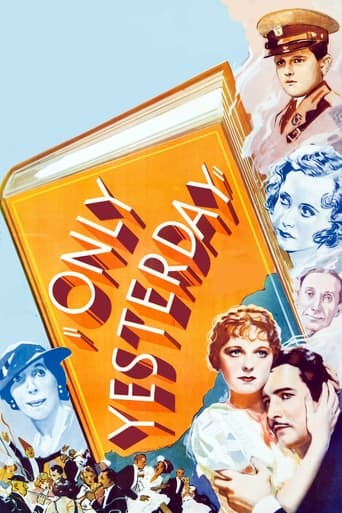

Wonderful character development!
... View Moregood back-story, and good acting
... View MoreI think this is a new genre that they're all sort of working their way through it and haven't got all the kinks worked out yet but it's a genre that works for me.
... View MoreThe acting in this movie is really good.
... View MoreThis was the first film of Margaret Sullavan, then aged 24. As the story requires her to age by eleven years, she does that very well in the film. She only had 26 more years to live, as she died aged 50 in 1960, having made no more than 21 films. Despite this restricted ouevre, her vivacity, charm, warmth, and wonderful smile have rendered her memorable to all lovers of the history of the cinema. She was what is called today 'authentic', a real person rather than just a screen goddess. In 1931 she married Henry Fonda, and was later married to William Wyler. But a series of family tragedies, including the suicide of one of her children, meant that she had a breakdown and an early death by 'accidental barbiturate poisoning'. She was the mother-in-law of Peter Duchin the pianist, who is still very much around, and it is difficult to find 'anyone who is anyone' in Manhattan who has not met him and been enchanted by his playing. Another son-in-law was Dennis Hopper, who together with Peter Fonda revolutionised American films with the famous EASY RIDER in 1969. In this film, directed by John M. Stahl, Sullavan plays a romantic young girl who falls in love with John Boles in 1918, they intend to get married, and have a night together, and then he is sent off to war in Europe with only a few hours' notice, so that the marriage is postponed indefinitely. Meanwhile, she had become pregnant and has a son. The social disgrace is too great for her Southern family, and she moves to New York, where she lives from then on with her free-wheeling and more broad-minded aunt, played by Billie Burke. Reginald Denny, the British actor, surprisingly appears in this film and plays Billie Burke's male friend whom she eventually marries. I never saw him do better with humour and comic banter than in his scenes with Burke, which are very effective. John Boles is very good as the leading man, who for so much of the film is absent. In the story, he forgets about Sullavan, and when she meets him after a victory parade through the streets of Manhattan, he does not recognise her. He has no knowledge of her having had a son, and she is so hurt by his not knowing her, that she goes away. We then see a title which says: 'Ten years later' and the story resumes. The ten year-old son is played excellently by Jimmy Butler, who is a natural on screen, and this was also his first film. But he was to have a tragic early death at the age of only 23, just before the end of World War Two, as a soldier in France. The story of the film gets sadder and sadder, and I do not wish to ruin any viewer's experience by commenting upon the events which follow. The film shows 'true love which lasts through the years', a theme largely forgotten today, when partners and spouses are thrown away like rag dolls. Just think, love did once exist, before sex completely took over and love got pushed aside as no longer being relevant.
... View MoreFailing to acknowledge the fact that the script is based on Stefan Zweig's "Letter from an unknown woman" notwithstanding, Stahl's "Only yesterday" is a jewel of a film.Beautifully written, directed and acted - it is refreshing to see how real films of the golden age of pre-Hayes Code could be. Absolutely no moral judgment is made of the unwed pregnancy of the character after her one night stand with the man she is fascinated with. Leaving Virginia and her crying mother behind for New York and her suffragette aunt (delightfully played by the talented and often typecast Billie Burke) who basically puts it down as a "biological occurrence", something to be lived through - something that happens. The film is full of little touches of real emotions and actions despite the heavy cinematic conventions of the era.A comparison with Max Ophuls' masterpiece "Letter from an unknown woman" (1948) is too thrilling to resist. In Stahl's more "realistic" version the character played by Margaret Sullavan goes from wide eyed ingénue to become the sophisticated witty Mary Lane - a woman who's been through it and kids herself no longer. Beffiting Ophuls' dark and moody amour foux fable - Liza Berndl (Joan Fontaine) though also going from naive to sophisticate (with some hints of prostitution) never gets over the romantic -almost neurotic- obsession with Stefan Brand (Louis Jourdan - the doomed don Giovanni of "Letter" as opposed to "Yesterday"'s regular Wall Street dilettante played by John Bole). Their reaction to a second chance with the object of their desire is as different as their characters...If you should come across this film in a midnight television screening or at your local cinemateque DO NOT MISS IT. Unfortunately you will not be able to find it in VHS or DVD. Time has been kinder to Ophuls' amazing film - if not quite fair either. Maybe one of these days the guys at the Criterion Collection will see to it...
... View More"Only Yesterday" (Universal, 1933), directed by John M. Stahl, marks the movie debut of stage actress, Margaret Sullavan. Capitalizing on the recent success of the first of three screen adaptations to Edna Ferber's romance drama, "Back Street" (1932), also directed by Stahl, and featuring Irene Dunne and John Boles, "Only Yesterday" improves over its predecessor in mood and drama, holding a viewer's interest even during its 108 minute length. In 1934, Universal and Stahl scored box office gold again with "Imitation of Life" starring Claudette Colbert and Warren William, followed by the 1935 version to "Magnificent Obsession" with Irene Dunne and Robert Taylor. With the exception "Only Yesterday," all the movies mentioned above remain memorable mainly because of its latter remakes, for that "Only Yesterday" not only never got remade, it's hardly ever reissued either television or revival theaters, making this a real curio for classic movie lovers.The story opens during the stock market crash of October 1929, causing many stockholders to go penniless and to blink of suicide. James Stanton Emerson (John Boles) has become one of the victims of the crash. He returns home where his wife, Phyllis (Benita Hume) is hosting a dinner party. Not wanting to tell the guests about the stock market, James locks himself in the other room, takes out his gun, writes a suicide note to Phyllis informing her that he cannot live on. But as he is about to do himself in, he notices a letter addressed to him left on his desk marked "URGENT." After opening and reading the letter, Jim thinks back twelve years ago when he was a young lieutenant who meets Mary Lane (Margaret Sullavan) in a party in Virginia. They dance, leave and disappear into the night. Upon their return, the couple find the party to be over. They bid each other goodnight and plan to see each other again. Later, Jim receives orders to report to France with his troops. Afterwards, Mary learns that she is pregnant, and to avoid a possible scandal, she leaves her family to go live with her Aunt Julia (Billie Burke) in New York City. After giving birth to a son the very day the World War ends, Mary tries to locate Jim to tell him the news, but when their paths cross again, on two different occasions, he fails to recognize her, thus leaving Mary to go it alone and raise the boy herself. After finishing reading the letter, Jim realizes there is something more important than himself to think about.The large cast listed in this photoplay include many familiar faces such as Reginald Denny as Bob; Edna May Oliver (mispelled Edna MAE Oliver in opening and closing credits) as Leona Maynard; Jimmy Butler as Jimmy Jr.; Marie Prevost as Amy; with Louise Beavers, Franklin Pangborn and Berton Churchill. During the course of the story, nostalgic tunes are heard, featuring: "Shine On, Harvest Moon" (sung by Billie Burke); "Remember" (by Irving Berlin, played on piano by Reginald Denny); and "Tip Toe Through the Tulips" (sung by Billie Burke). Although Universal could have easily reunited Irene Dunne and John Boles, stars of "Back Street" into this collaboration, since many supporting players from that film were reunited here, including George Meeker, June Clyde, Walter Catlett, Robert McWade and Jane Darwell, the introduction of the youthful Margaret Sullavan gives this story a whole new different outlook, making this a worthy beginning to a fine actress in a very sensitive performance. Sullavan would star in other Universal dramas, especially the 1941 remake to "Back Street," but she is best remembered for her numerous films produced at MGM, particularly "The Shop Around the Corner" (1940) with James Stewart. While John Boles is usually works well in light musicals and comedies, and often type-cast as a neglected but caring husband or "Mr. Nice Guy" in other films through most of the 1930s, it's sometimes hard to accept him playing a man of the world on furlough who seduces innocent young women and unintentionally forgetting about them, a kind of movie role better suited for the Warren William-type of actor. After seeing this production in a very rare TV showing (WNET, Channel l3, New York City, in 1983), two things come to mind: The youthful Margaret Sullavan's unforgettable performance, the other being the question as to why "Only Yesterday" remains to this day a very obscure film. (***1/2)
... View MoreThis is a great film with an absolutely amazing script. While Margaret Sulivan has a tremendous break out performance, in my opinion it is John Boles as the philandering Jim and Billie Burke as the suffragist aunt that really make the film. John Boles in particular has some really great lines. My favorite line of the film was when the married Jim is trying to seduce Margaret on New Year's Eve and he takes her to his secret bachelor pad and tells Margaret that this is where he lives. Margaret says something like, `Strange it doesn't have a woman's touch.' And Jim replies that while he doesn't eat, sleep, or hang out with his family here, this is where he LIVES. Jim is just a pimp. While this film is difficult to see since they don't have it on video or show it on cable, it is really a must see movie for anyone interested in pre-code film. It is an absolutely wonderful movie.
... View More